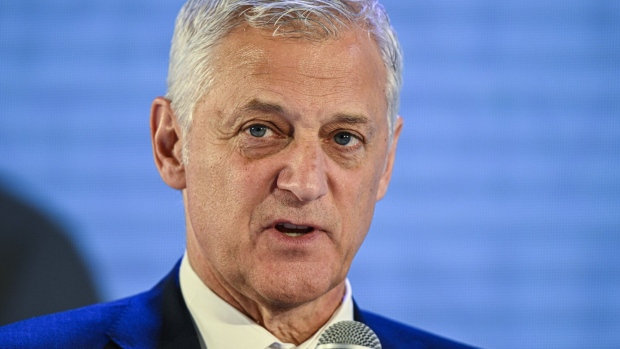Feb 22, 2024
Standard Chartered Announces $1 Billion Buyback as Profit Beats
, Bloomberg News

(Bloomberg) -- Standard Chartered Plc pledged to hand back more money to shareholders as it outlined efforts to improve returns and reduce complexity at the emerging markets-focused lender.
Reporting fourth-quarter profits that beat analyst estimates, the London-headquartered bank said it would kick off a fresh $1 billion buyback. The firm said a new “Fit for Growth” program will save about $1.5 billion in expenses over the next three years, but also add a similar amount to costs for the permanent organizational changes.
Chief Executive Officer Bill Winters, who joined the group almost nine years ago, has been looking for ways to bolster returns for investors and galvanize the stock, which has sunk more than 15% in the past year. He described the share price as “crap” in a Friday press conference, saying he was determined to change the market’s perception of the bank.
“We’re not happy with the share price at all,” Winters earlier said on Bloomberg Television. The market has “a sense that it’s hard to get things done at Standard Chartered and this Fit for Growth program is going to tackle that head on.”
Standard Chartered’s adjusted pretax profit rose 63% to $1.06 billion in the three months through December, beating an estimate of $989.6 million. The lender declared a final dividend of 21 cents a share, raising the full-year payout by 50%. It unveiled new guidance, targeting a 12% return on tangible equity in 2026 and a 5% to 7% growth in operating income for 2024 to 2026.
Shares jumped as much as 10% in London on Friday.
Options
Despite its exposure to some of the world’s fastest growing markets in Asia, Africa and the Middle East, Standard Chartered shares have performed poorly in recent months and are almost 40% below the level they were when Winters joined the bank in June 2015.
The bank is weighing restructuring its institutional banking arm, the unit that houses the firm’s investment bankers and traders, Bloomberg News reported earlier. Options include separating its investment bank from its corporate and commercial banking operations, according to people familiar with the matter. The move could lead to job cuts and is one of several possibilities being weighed with no final decisions made yet, the people said, asking not to be identified discussing matters still under consideration.
StanChart logged a profit decline in the third quarter, hit by charges related to investments in China. Bigger rival HSBC Holdings Plc earlier in the week took a hit to profits as it made impairments on investments in China, which is being dogged by weak confidence and a prolonged crisis in its real estate market.
“We’ve taken very material provisions there, well ahead of our peers who have investments in Chinese banks,” Winters told reporters on a media call.
StanChart saw heavy selloff in its shares when it announced its third-quarter earnings as investors reacted to news of fresh charges against Chinese real estate and a $700 million impairment on its stake in China Bohai Bank. The stock tumbled more than 12% on Oct. 26, its biggest loss since August 2012.
What Bloomberg Intelligence Says
Standard Chartered’s plan to keep costs below $12 billion in 2026 and its revenue’s lowered sensitivity to rate cuts are critical to keeping operating jaws positive and delivering its new guidance of 12% return on tangible equity in two years, some 200-bps above consensus. A $1 billion buyback and $5 billion total return plan by 2026 is also incrementally positive.
Tomasz Noetzel, BI analyst
--With assistance from Tom Mackenzie.
(Adds quote from press conference in third paragraph.)
©2024 Bloomberg L.P.






